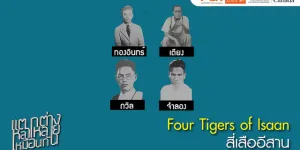By Tara Abhasakun |
<p>Mixed-race youth are still bullied in Thailand. One teacher is trying to change this.</p>
By The Isaander; Weerawat Somnuk, Smanachan Buddhajak, Donlawat Sunsuk, and Somchai Saefad |
<p>The aridity of the Thung Kula Ronghai region’s alkaline soil is behind the Hom Mali rice strain’s popularity as a world-renowned export. The rice farmers and the special care they put into their production method have succeeded in turning their despair at the unpredictability of the rain cycle into assets. While quite a number of Isaan (northeastern Thai) people prefer sticky rice to regular rice for everyday consumption, the jasmine or ‘Hom Mali 105’ variety has been grown in Isaan for 70 years. How did the popularity of this particular rice variety come about?</p>
<div>
<div>The courts have dismissed defamation charges against a controversial motivational speaker who in a talk last year accused Isaan people of being disloyal to the late King Bhumibol.</div>
<div> </div>
<div>November last year, Thai social media was flooded with video clips of motivational speaker Orapim ‘Best’ Raksapon. She was reportedly subsidised by the Royal Thai Army to give lectures on the late King Bhumibol across the country.
</div></div>
<div>
<div>Three years after it staged a coup, Thailand’s junta is subjecting rural people to harassment and prosecution, but pleasing investors, according to local NGOs. </div>
<div> </div>
<div>The National Council for Peace and Order (NCPO) has been repeatedly criticised for its failure to solve economic problems and for the slide back to authoritarianism.
</div></div>
By John Draper |
<p>In the past months, dozens of multilingual signs have been installed across Khon Kaen province in Northeast Thailand. Part of an innovative cultural maintenance and revitalisation project, the signs bear messages in three languages - Thai, Isaan (Thai Lao) and English.</p>
By Frank G Anderson |
<p>Many foreigners, it seems, often cite the Thai media as being cowardly and not performing the noble job that the Fourth Estate is poetically linked with – establishing truth, fighting injustice, exposing graft, fighting for the people, etc. For Thai media critics or just people that want to read why things are so difficult for Thai media, allow me to relate a story to you…</p>
<p>Note that often below when I say “I” I might be referring to my Thai wife who was legally registered as the paper’s owner and editor.</p>
<div>
<p>Human rights defenders and students activists have been summoned for allegedly conspiring with an anti-junta activist, who is currently on a hunger strike, to host a seminar criticising the junta-sponsored draft constitution. The human rights defenders insist they merely monitored the seminar. </p>
</div>
<p>The Thai military prohibited discussants at a public forum in Isaan, Thailand’s northeast, to talk about politics, referendum, and the lèse majesté law. The authorities however ironically allow them to talk about human right issues only.<br /></p>
<div>
<div>A group of villagers in Isaan have been summoned to a military camp as an alternative to facing criminal charges after they joined the red-shirt referendum watch campaign.
</div></div>
By Austin Silvan |
<div>As a Canadian Masters student who is researching development practices in Thailand, and works at Prachatai, I often hear and read about conflicts between authorities and activists. After observing interactions between the two groups this past weekend, from the explanations given by the authorities for their interventions at least, it seems like they are there just to help out! Let me explain. </div>
<div> </div>
<div>There is an activist group called the New E-saan Movement, which is located in the northeast region of Isaan, in Thailand.
</div>
By The Isaan Record |
<p>KHON KAEN – In late January, about 250 Northeasterners from six provinces gathered at the conference room of the Petcharat Garden Hotel in Roi Et to participate in the drafting process of Thailand’s twentieth constitution. The military government claims to be seeking citizen participation in drafting the constitution, but these public forums to gather input from Thais across the country seem to be nothing but a false front in the Northeast.</p>



